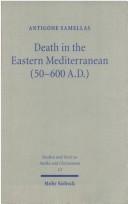| Listing 1 - 4 of 4 |
Sort by
|

ISBN: 3161476689 Year: 2002 Publisher: Tübingen : Mohr Siebeck,
Abstract | Keywords | Export | Availability | Bookmark
 Loading...
Loading...Choose an application
- Reference Manager
- EndNote
- RefWorks (Direct export to RefWorks)
Funeral rites and ceremonies, Ancient --- Death --- Church history --- Eschatology, Ancient. --- Funérailles --- Mort --- Eglise --- Eschatologie ancienne --- Religious aspects. --- Rites et cérémonies --- Histoire --- Aspect religieux --- 393 <4-015> --- Dood. Dodengebruiken. Dodenritueel. Lijkverbranding. Begrafenis. Crematie. Rouw. Opbaren. Lijkstoet. Sterven. Dodenmaskers--Middellandse-Zeegebied --- 393 <4-015> Dood. Dodengebruiken. Dodenritueel. Lijkverbranding. Begrafenis. Crematie. Rouw. Opbaren. Lijkstoet. Sterven. Dodenmaskers--Middellandse-Zeegebied --- Funérailles --- Rites et cérémonies --- Christianity --- Eschatology, Ancient --- Ancient funeral rites and ceremonies --- Eschatology --- Intermediate state --- Apostolic Church --- Church, Apostolic --- Early Christianity --- Early church --- Primitive and early church --- Primitive Christianity --- Fathers of the church --- Great Apostasy (Mormon doctrine) --- Religions --- Influence --- Religious aspects
Book
ISBN: 9783039117895 3039117890 Year: 2010 Publisher: Frankfurt am Main [etc.] Peter Lang
Abstract | Keywords | Export | Availability | Bookmark
 Loading...
Loading...Choose an application
- Reference Manager
- EndNote
- RefWorks (Direct export to RefWorks)
Church history --- Christianity --- Alienation (Social psychology) --- Eglise --- Christianisme --- Aliénation (Psychologie sociale) --- Histoire --- Aliénation (Psychologie sociale)
Digital
ISBN: 9783035100266 Year: 2010 Publisher: Bern Berlin Bruxelles Peter Lang
Abstract | Keywords | Export | Availability | Bookmark
 Loading...
Loading...Choose an application
- Reference Manager
- EndNote
- RefWorks (Direct export to RefWorks)
This book is a comprehensive study of the experience of alienation in its many and inter-related manifestations as attested in the late-antique East. It situates Christianity’s enduring legacy in its early historical context and explores the way estrangement from all worldly attributes was elevated to the status of a cardinal religious virtue. The author analyzes the reasons for the new faith’s concern for the marginalized and shows the contemporary relevance of social utopia as an antidote to alienation. Christianity’s contradictions are also examined as, in opposing the existing legal order, the followers of the monotheistic religion inadvertently supported the violence of the imperial authority and its laws. Further, the study focuses on the existentialist and psychological dimensions of time-honoured metaphors, such as «Life is a theatre» and «Dead to the world», and investigates mental illness in late antiquity. Finally, the early origins of the modern concept of the self are traced back to the ideological transformations that marked the slow transition from antiquity to the middle ages.
Book

ISBN: 9789464202847 Year: 2021 Publisher: [Brussel] Kyklàda.press
Abstract | Keywords | Export | Availability | Bookmark
 Loading...
Loading...Choose an application
- Reference Manager
- EndNote
- RefWorks (Direct export to RefWorks)
What would be of contemporary culture if we did not recognize the impact of migration in cultural and socio-economic crossings? This book explores human migration in different times, contexts, and geographies surrounding the Aegean Sea. Through an assemblage of voices, lived experiences, historical documents, urban and rural dislocations, this publication examines responses to mobility of the ones on the move, and of the ones living in the destinations the former are heading to. It speaks of the sacrifices one is forced to make en route and at its antipode; the implications of voluntary migration to a place, steered by investment in real estate.
cultuurfilosofie --- migratie --- 130.2 --- Griekeland --- politiek
| Listing 1 - 4 of 4 |
Sort by
|

 Search
Search Feedback
Feedback About UniCat
About UniCat  Help
Help News
News